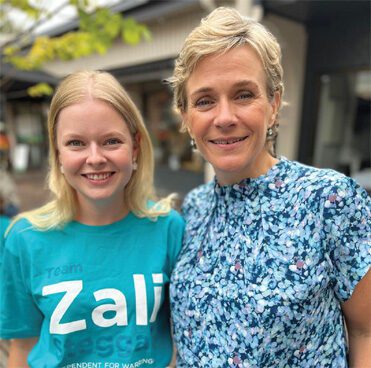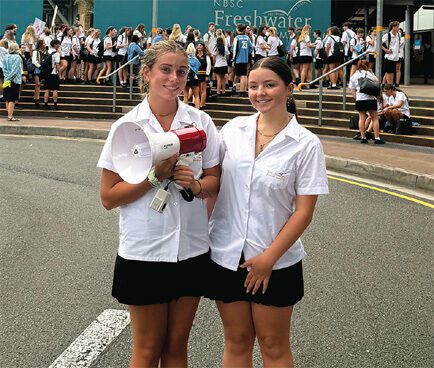In a world of uncertainty, one thing is clear – young people are increasingly unafraid to use their voices for change. Disillusioned with government, fighting for a better climate future, Gen Z are leading the way when it comes to activism. Catherine Lewis reports.
Those who think youth is wasted on the young may want to rethink that stance. Gen Z – those born between 1995 and 2009 and raised against the shifting sands of the global financial crisis – are paving the way as the most vocal and active generation in calling for social change. Rooted in frustration with political stances, higher burdens of debt, high-cost, low-availability rentals and fading chances of home ownership, youth activism – young people coming together to advocate for a better, brighter future – is changing the world.
From global inequality, to climate change, healthcare, gender equality, LGBQT+ rights and societal unrest, there is little that has not been touched upon by Gen Z. And yet they have been historically underestimated. As national youth-led body, UN Youth Australia says: “Young people are affected, but often left out of solutions.” Making up 22% of the global population and 27% of that workforce, the tide is turning as the colossal power they wield comes sharply into focus, with research giant Edelman revealing that 70% are now involved in a political or social cause, and brands are clamouring for their attention and a chunk of their socially-conscious buying power.
Their vast sway comes from being the first truly global generation, via the tidal wave of tech that has homogenised pop culture. Social media allows young people to feast on issues and events 24/7, with Reuters Institute research finding that sites such as Instagram and TikTok are leaving traditional news sites in the dust, with the latter now used by 44% of 18 to 24-year-olds for socials and news. Hashtags – such as the #MeToo movement – have become rallying cries, proving that while social media has many drawbacks, it can also be a positive force for good. Gen Z are also the most likely to boycott a brand due to misaligned stances, a hugely powerful form of social activism, with the ‘power of the purse’ pressuring brands to reconsider policies. And, while past generations had many of the same concerns, Gen Z can source, disseminate and mobilise troops at the touch of a button, amplifying their call to action – and their influence – to a degree their elders could only dream of.
It is this collaborative effort that Joanna Rostami, chief executive officer of the Australian Youth Affairs Coalition, the national peak body for youth, says needs to be applied by decision makers when shaping effective policies for future generations. “It is imperative that young Australians have a seat at the table in these important conversations,” she says. Lead author of the Australian Youth Barometer – which gauges pressures currently experienced by young Australians – and Director at the Centre for Youth Policy and Education Practice, Lucas Walsh, agrees, saying that ‘young people are asking us to meet them halfway.’ “A concrete approach is needed to address intersecting challenges of their lives – employment, education, housing and climate change – which they’re telling us need urgent attention.”

Lea Gleitsmann is one of Zali Steggall’s ‘GenZali’ and keen to do her part within the Warringah electorate
One local youth leading the charge is Northern Beaches Secondary College (Freshwater Senior Campus) student, Aysha Hogan, 16. In just two days, the Year 11 organised a mass walkout in February to protest State Government plans to scrap the hugely successful ‘seniors only’ model and incorporate Year 7 onwards, as part of Labor’s promises to provide Sydneysiders co-educational schools. Aysha’s actions, aimed at saving the unique culture, won a reprieve following huge media interest, and resulted in current students being permitted to complete their HSC under the current status quo. Years 7 and 8 will now start at the school in 2027, with a full cohort in 2028. “I stood up as the changes directly affected my year, meaning while completing our most important secondary education, we faced the complications of change,” Aysha tells Peninsula Living. “It was easy to rally my peers, as we all felt the same way, Year 11s and 12s alike, and even former students recognised how powerful it is to have a senior-focused environment,” she adds.
“Young people must engage – if you’re not at the table, you’re on the menu!” Lea Gleitsmann GenZali
Aysha feels the State Government ‘limits the influence young activists have on their decisions.’ “There is continual ignorance of what we as students want, when we are the ones who the decision impacts.
“The government consultation significantly lacked fair representation from past, present and incoming students and did not truly consider the voice of young people,” she says. “The fact that the decision has now been delayed, shows some recognition of our efforts, but fails to address the root issue – young voices are overlooked within our community, despite us becoming the next big decision makers.”
Aysha’s mother, Katrina Sloane, says the school community will not give up, and fundraising for a legal challenge is sitting at almost $14,000. “We should be fostering the same behaviours we expect of our young people – listening with respect, considering different perspectives, and supporting meaningful dialogue,” she says.
In agreement is Manly Ward councillor Sarah Grattan, telling Peninsula Living: “I’m very disappointed for the students and families of Freshie High, as having a senior campus high school has been a unique and successful model. As a local high school parent, I participated in the consultation. Parents of current students strongly believed in the current model, however the consultation relied more heavily upon the results of parents with younger students. In my opinion, the loss of Freshie High School is a loss for public education.”
“There is continual ignorance of what we want, when we are the ones who the decision impacts.” Freshwater High’s Aysha Hogan

Freshie High protest organisers, Aysha Hogan and Sophie Steele
And it’s not just Freshie taking a stand. Over in Western Sydney, students at Granville Boys High School recently teamed up with teachers and parents to protest the barring of student support officer, Sheikh Wesam Charkawi, following his social media video criticising Australian politicians for their response to two Bankstown nurses who allegedly threatened Israeli patients.
The aptly-named GenZali – young volunteers working alongside Independent Warringah MP Zali Steggall – is packed with Greta Thunbergs in the making, all keen to engage other youth in politics, educating them on the importance of using their vote – and their voice. Greta Thunberg was the instigator of School Strike for Climate, which she started aged just 15 in Sweden – the Friday movement which spread like wildfire across the globe, even in Australia.
“We want to bring young people together so that they can share their stories and needs, as it is only then that they will be heard and taken seriously in Canberra,” GenZali member, Lea Gleitsmann, tells Peninsula Living. “At 10 years old, I watched Tony Abbott call Julia Gillard a witch on television, but it was only when Zali Steggall defeated him in 2019, that I understood the impact of the total lack of respect and understanding current politicians had for me and my future. When Mackellar and Warringah, two very safe Liberal seats, were challenged during COVID-19 and the bushfires, I wanted someone to represent me that respected me as a young person who needed climate action to be taken seriously. It is crucial for us to engage and become familiar with how our local members will work to make our lives better – if you’re not at the table, you’re on the menu!”
Youth activism is about so much more than protest. It’s about spreading awareness, educating others – often on a global scale – and advocating for changes that will trickle through generations. Flying in the face of pushback, young people are showing that youth is no barrier when it comes to making a difference. Rather, it brings a sense of urgency, of authenticity and a fresh, unjaded perspective on the issues that truly matter. Young people are in tune with what is troubling future generations, and in tune with how to reach them. As Katrina Sloane says: “Their activism today shapes the future they will inherit.”








